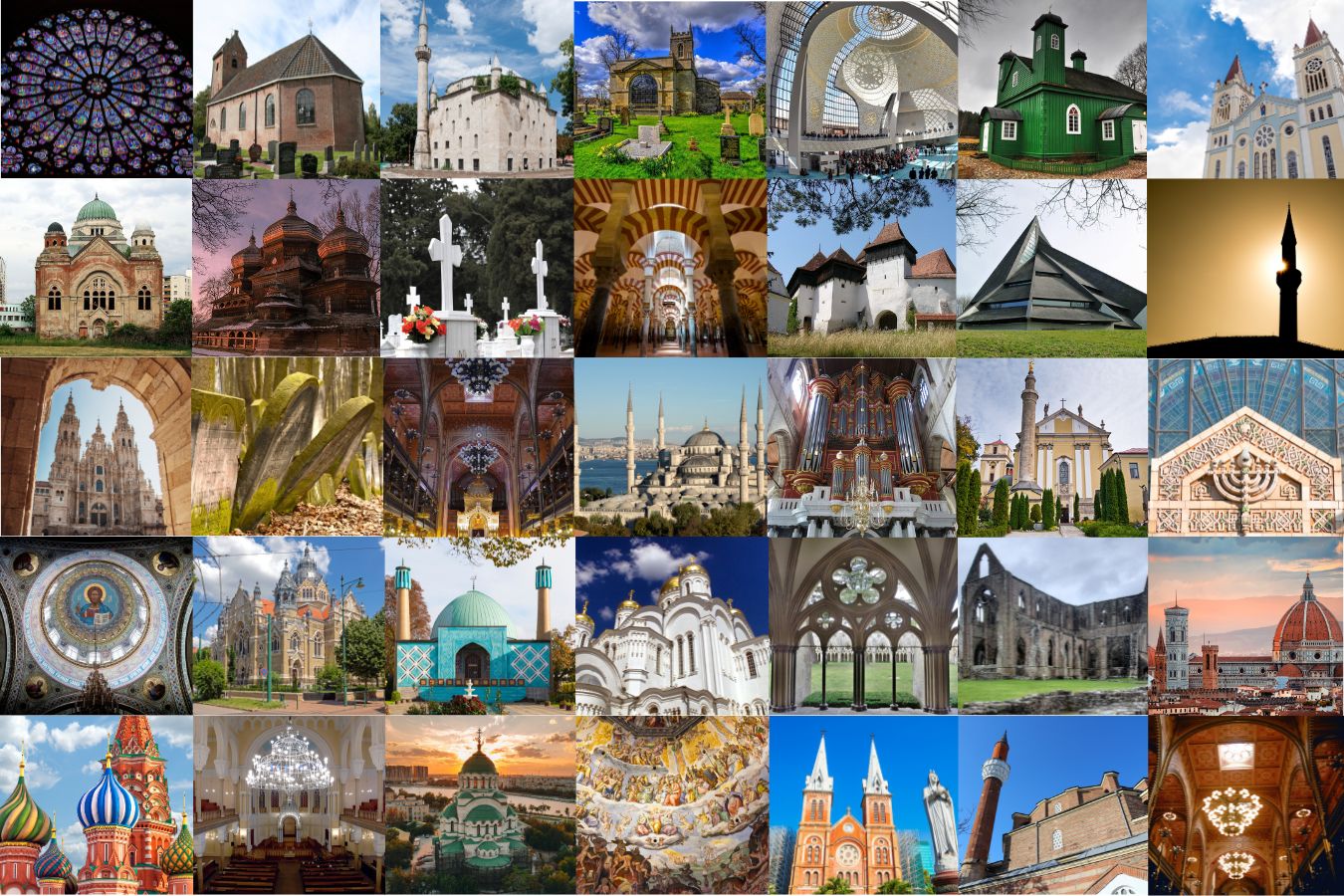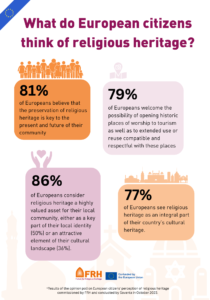
Brussels, 3 April – A new opinion poll shows that 81% of European citizens agree that the preservation of Europe’s historic places of worship is key for their community’s present and future. The opinion poll was commissioned by Future for Religious Heritage (FRH), the European network for the protection and promotion of historic places of worship that has been advocating for the appreciation of the cultural, historical and artistic value of religious sites for over a decade.
The poll was conducted by Savanta in October 2023 among 8,000 Europeans in France, Germany, Greece, Poland, Romania, Spain, Sweden, and the United Kingdom. Respondents were also asked about other questions such as the place of religious heritage in their country’s cultural heritage, why it is important for their community and the possibility of extending the use of religious buildings beyond their religious function.
The poll shows that 77% of Europeans agree that religious heritage – the over 500,000 churches, synagogues, mosques and other religious buildings as well as their art, crafts and ceremonies – is an integral part of their country’s cultural heritage.
For 86% of Europeans, religious heritage is a highly valued asset for their local community. The top two reasons were that these places are a key part of their local identity (50%) and an attractive element of their cultural landscape (36%).
Notre Dame de Paris (France), the Mosque-Cathedral of Cordoba (Spain), the Dohany Street Synagogue in Budapest (Hungary), Ely Cathedral (United Kingdom), Jasna Gora (Poland), Norwegian stave churches or the painted monasteries of Bucovina (Romania) are all examples of how religious sites can be true emblems of a city, a region, or an entire country.
The opinion poll also shows that 79% of European citizens welcome the possibility of extending the use of religious buildings beyond their religious function, either by opening them to tourism when they are of architectural value or contain important artistic treasures or to other non-religious cultural activities that are respectful and compatible with these sites.
Examples of reused religious buildings can be found all across the continent: the popular Dominicanen bookshop in Maastricht (The Netherlands), the lively Mercato Mayfair (United Kingdom) the majestic Abbaye de Talloires (France) or the colourful Skate Church (Spain).
Pilar Bahamonde, FRH President said:
“No surprise at all that European citizens support the cultural and identity value of religious heritage. Generations of European craftsmen, artists, architects, engineers, musicians and citizens gave their utmost to raise the most outstanding buildings of our villages, towns and cities over thousands of years.
Pilgrimage routes that run across the European landscape create an invisible backbone that connects rural and urban citizens, marks spaces and moments of serenity, offers inclusive community encounters, and develops social bonds between pilgrims and locals, nourishing the identity of Europe.”
Sir Simon Jenkins, renowned British journalist and author, commented on the results of this opinion poll:
“Places of worship are not only an irreplaceable witness to the architecture, art and faith of the past that we must care for, but also an important element of local identities that make them welcoming places for encounter, dialogue and exchange in an increasingly secular and diverse society.”
Europe’s religious heritage
Europe has over 500,000 religious buildings, including churches, synagogues, mosques, chapels, monasteries and other places of worship. These places often house priceless collections of art, historic artefacts and centuries-old archives, and are home to rich cultural traditions and heritage crafts that tell us about the history, culture and traditions of each European region.
In an increasingly secular Europe, it is remarkable how important its citizens view our amazing patrimony of religious heritage. This is a real boost to the many thousands of people who look after churches, synagogues, mosques, chapels, monasteries and other places of worship.
Our new opinion poll shows that these buildings and the history and traditions that are essential part of religious heritage are at the heart of European heritage. This message is a gleam of light and shows that the work of safeguarding religious heritage has the support of Europe’s citizens.
 _________________________________________________________________________________________
_________________________________________________________________________________________
About Future for Religious Heritage (FRH)
Future for Religious Heritage (FRH) is an independent, non-faith, non-profit European network founded in 2011 and based in Brussels to promote, encourage and support the safeguard, maintenance, conservation, restoration, accessibility and embellishment of historic places of worship.
The network has established itself over the years as a major player in the field of cultural heritage, bringing together the voices of 80 organisations and 150 individuals working to protect and promote religious heritage across Europe. Members include NGOs, governmental organisations, religious bodies, university departments, researchers, academics and people with an interest in religious heritage.
It is currently one of the 36 European networks supported by the Creative Europe Networks programme of the European Union.





Follow us: